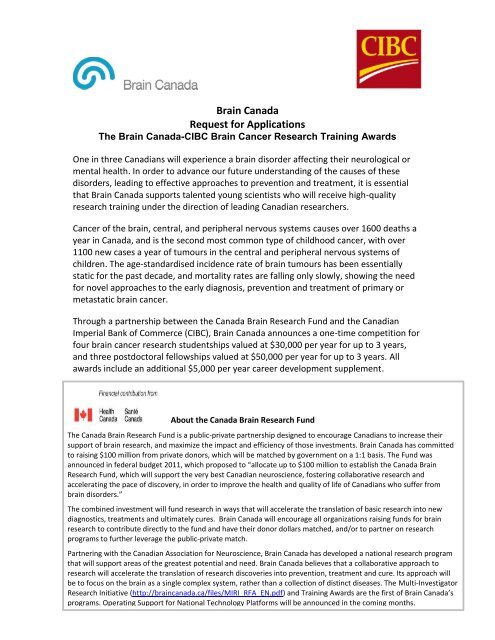Brain Canada-CIBC Brain Cancer Research Training Awards
Brain Canada-CIBC Brain Cancer Research Training Awards
Brain Canada-CIBC Brain Cancer Research Training Awards
You also want an ePaper? Increase the reach of your titles
YUMPU automatically turns print PDFs into web optimized ePapers that Google loves.
ScopeThe awards will be made to outstanding doctoral students and postdoctoral fellowsundertaking a program of research training that incorporates original research into theorigins and consequences of cancer affecting the central and peripheral nervoussystems, either as primary or metastatic tumours. <strong>Research</strong> projects dealing withprimary tumours of origin outside the nervous system must be focused on theirmetastasis and subsequent proliferation within the nervous system. <strong>Research</strong> projectsmay also focus on the identification of risk factors, novel strategies for prevention, earlydetection, and treatment of brain cancer, or for improving the quality of life, includingpalliation, for those living with brain cancer and their family caregivers.EligibilityCitizens of any nation may apply; however, training must be undertaken at an institutionlocated within <strong>Canada</strong>. Please follow the decision tree to determine your eligibility toapply for an award.Other funding:Supervisor:<strong>Training</strong> location:Additional ConditionsMay hold another award if the combined annual amount does not exceed$40,000 (student) or $60,000 (fellow)Permitted by employer to supervise research trainees, and eligible to receivefunding from the three federal granting agencies (CIHR, NSERC or SSHRC).A research institution located in <strong>Canada</strong> that is eligible to receive fundingfrom the three federal granting agencies 1 , 2 .1 Short visits to industrial, governmental, and international research institutions are permitted to enhancethe training experience, and approved by the supervisor.2 If candidates are continuing postdoctoral training in the same department or under the direction of thesame supervisor as for their doctoral studies they must justify this decision in the research proposal.2
publications, conference and invited presentations, research awards and prizes, andother research distinctions. Add any other information that you believe wouldpersuade the reviewers of your exceptional research potential (one and a halfpages).Page 4 (lower). Referees. List the names, phone numbers, institutional and emailaddresses of three individuals who have agreed to provide references (see“Reference Letters”, below). Page 5 a,b,c. Supervisor’s Statement, to be completed by your supervisor (up to 3pages).1. Please tell us how many trainees have been under your supervision, and at whatlevel (summer/ undergraduate, MSc, PhD, PDF, etc.), from 2008 to the present.2. From this group of trainees, select up to five and tell us about theiraccomplishments arising from their training under your supervision. Pleaserestrict your commentary to accomplishments that are a matter of public record,such as publications, prizes, awards, and other distinctions.3. Explain how you will acquire sufficient operating funding to sustain thecandidate’s research project through to the end of the award.4. Outline the opportunities that the candidate will have while under yoursupervision for enrichment through interdisciplinary or intersectoralcollaboration.5. List five of your publications that you consider most significant. Three must havebeen published in 2008 or later. Each item should be annotated with a briefreason for the selection. Include a DOI, URL or PMID where applicable so thatreviewers can more easily access them.6. Please conclude with the following statement “I agree to supervise [name ofcandidate] for the duration of the award if the application is successful, and I willadvise <strong>Brain</strong> <strong>Canada</strong> immediately if (s)he terminates research training orotherwise experiences a significant interruption. I permit <strong>Brain</strong> <strong>Canada</strong> to sharethe information about me contained in this application with actual or potentialfunding partners, under a confidentiality agreement”, followed by signature,typed name, and date.Format. For all pages of the application, use 12 point Arial or Georgia font, singlespaced,on a letter-size page with 1" minimum margins. It is the sole responsibility ofthe applicants to ensure their submission is acceptable and received before thedeadline. Those applications received in any other format, exceeding the page limits,incomplete, or late, will be rejected. <strong>Brain</strong> <strong>Canada</strong> will acknowledge receipt ofapplications by email within one working day.Reference letters. Three individuals, excluding your intended supervisor, familiar withyour prowess as a scholar and researcher, must provide one-page reference letters onyour behalf. At least one letter should be from a previous research supervisor, ifapplicable. The most useful letters explain the nature of the interaction between thecandidate and the referee, and provide specific examples of situations where thecandidate demonstrated creativity, initiative, collaboration, and other qualitiespredictive of a successful researcher. They also mention areas of knowledge, skill, orattitude where the candidate would benefit from further training.4


